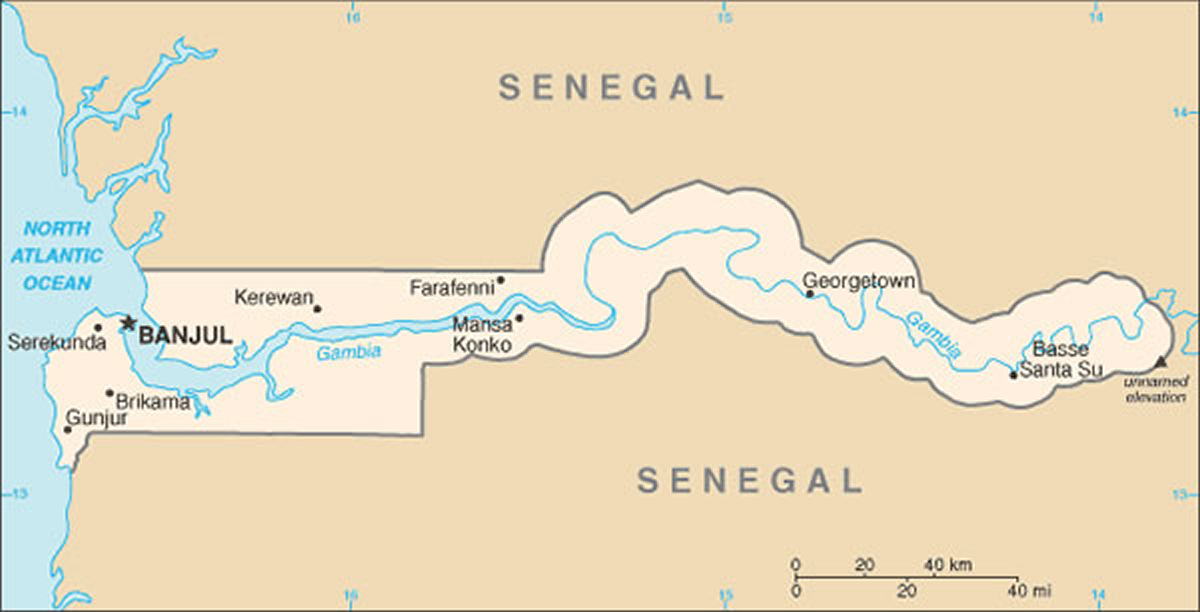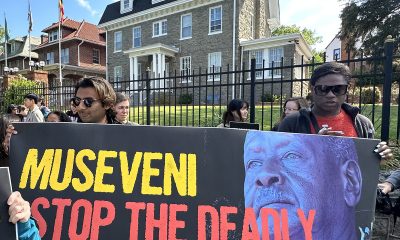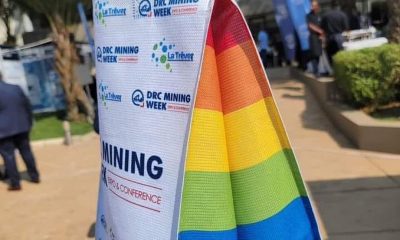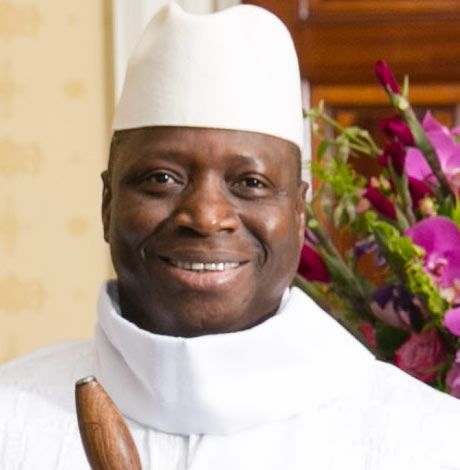Africa
LGBTQ, intersex Gambians continue to suffer persecution
Ousted dictator Yahya Jammeh once threatened to slit gay men’s throats

LGBTQ and intersex Gambians continue to face persecution, even though President Adama Barrow ousted Yahya Jammeh in 2016 after 22 years in power.
Jammeh during his rule enacted several laws that specifically targeted LGBTQ and intersex Gambians.
The former president who is currently in exile in Equatorial Guinea introduced the Criminal Code (Amendment) Act 2014 that carried a life sentence for anyone who was found to be LGBTQ. Jammeh, among other things, also threatened to slit gay men’s throats
Many Gambians who identify as LGBTQ or intersex fled the country because they feared arrest or even death.
Jammeh’s own nephew, Alagie Jammeh, in 2014 posted on Facebook that no one should be denied their fundamental basic human rights because of their sexuality.
Alagie Jammeh in 2017 asked for asylum in the U.S. because he feared arrest in Gambia. The U.S. the same year sanctioned Yahya Jammeh under the Global Magnitsky Human rights Accountability Act.
Unlike Uganda and Nigeria — two countries where LGBTQ and intersex communities publicly exist and advocate for themselves in spite of widespread persecution — there is no such organized civil society in Gambia because it is too dangerous.
According to Yankuba Keita, a human rights advocate based in Gambia, advocating for or identifying as part of the LGBTQ and intersex community still has the same repercussions that existed in 2014.
“Nothing has really changed on that issue for the LGBTQ+ community in the Gambia as they still face harassment, intimidation and attacks from people and religious leaders constantly come out to condemn them in totality during their Friday summons,” said Keita. “Gambia religious leaders are all against the rights and freedoms of LGBTQI+ persons with some even calling for them to be killed. Furthermore, some politicians use the same sentiments as a political tool to campaign for more followers.”
Keita said the LGBTQ and intersex community will remain at risk until the government repeals the harsh laws that target it and social awareness increases.
“The political will has to be there first and the mindset of the people has to change towards the LGBTQI+ community through advocacy and engagement of the religious leaders,” said Keita.
The government maintains that although the law prosecutes those who identify as LGBTQ and intersex, reports of arbitrary arrests and killings based on sexual orientation or gender identity are overblown.
The Women In Liberation and Leadership in collaboration with South Africa’s African Men for Sexual Health and Rights and Switzerland’s Sexual Rights Initiative in 2019 made some recommendations in regards to the criminalization of sexual orientation, gender identity and expression in Gambia.
Gambia, according to the organizations, should repeal all legislation that criminalizes consensual same-sex sexual relations between adults and take all necessary measures to prevent discrimination and violence on the basis of sexual orientation. The organizations also urged the Gambian government to amend bills that limit freedom of expression, assembly of LGBTQ and intersex people, remove all administrative and legislative barriers to the recognition and registration of organizations working on LGBTQ and intersex issues and allocate 15 percent of the country’s annual budget to the health sector.
The organizations also recommended the Gambian government grant full refugee status, protection and support to LGBTQ and intersex people who have sought asylum in the country in compliance with the U.N. High Commissioner for Refugees guidelines on international protection.
Daniel Itai is the Washington Blade’s Africa Correspondent.
Africa
For queer Nigerians, being on gay dating apps is still a risk
Homophobes target users for violence

Gay hookup apps like Grindr, and dating apps like Tinder and Bumble have managed to proliferate queer communities in countries like Nigeria.
Those who seek one night stands find what they want while those looking for love equally find what they seek. These platforms have managed to position themselves as safe spaces for queer people in anti-gay Nigeria. In recent times, however, it is proving to be unsafe, as homophobic people are quickly learning about the apps, and opening accounts that either seek to outrightly threaten queer people, or pretend to be queer, have long chats with gay people, invite them over, and inflict violence on them.
Take the case of Biodun, a queer Nigerian man who joined Grindr to meet up with guys like him.
After Biodun had built a connection and agreed to meet with someone whose display name was “Mamba,” they decided to meet up only for him to be met with violence. Apparently, Mamba ran a catfish account.
“I’ll never forget that day,” Biodun, who asked the Washington Blade not to use his last name because of safety concerns, said. “I still think about it, and sometimes blame myself for being very careless, even though Grindr was supposed to be our safe space.”
Biodun’s experience isn’t peculiar to him.
In Nigeria, draconian laws that criminalize same-sex relationships exist, making queer people turn to the digital realm to explore their identities and seek connections beyond the confines of societal oppression that comes with the physical environment. Gay dating apps such as Grindr, therefore, have emerged as virtual sanctuaries, offering spaces for queer Nigerians to forge friendships, find solidarity, and pursue romantic or sexual relationships. Spaces like this, however, have morphed into a landscape fraught with danger, as homophobic people have weaponized these platforms to perpetuate hate and violence.
“Sometimes, I often wonder how they learned about these platforms,” Daniel, which is not his real name, told the Blade. “You would think that it is just us in the platforms, until you find out that the accounts are rooted in homophobia.”
One time, someone’s bio read, “I’m only here to deal with the gay people. I know all of you, and I will find and kill you. We no want una for here (translates to we do not want you here, in English.)” It was a stark reminder that these spaces are no longer LGBTQ-friendly for Nigerians. In 2014, there was the passage of the Same-Sex Marriage Prohibition Act by former President Goodluck Jonathan, which not only criminalized same-sex unions, but also imposed severe penalties on anyone involved in LGBTQ advocacy or support.
This law catalyzed a surge in discrimination and violence against queer Nigerians; emboldening regular civilians, religious extremists, and even law enforcement agencies to target individuals perceived as deviating from traditional gender and sexual norms. Again, amid this hostile environment, gay dating apps emerged as lifelines for many queer Nigerians, offering avenues for discreet communication, community building, and the pursuit of intimate relationships.
The very anonymity and freedom these apps provided, however, became double-edged swords.
The advent of screenshot and screen-recording capabilities on these apps, for example, reduced the risks of exposure, strengthening the safety and privacy of users. However, this also comes with its own lapses, as queer people using Grindr have often relied on screenshots and screen recordings to confirm the identities of potentials with their friends, before accepting to meet.
“Before the removal of the screenshot option, I usually shared photos of others with my trusted friends,” Biodun shared. “But since that was taken off, there was no way for me to do that.”
Although, according to Grindr’s terms and conditions, the removal came with privacy concerns, as it was to facilitate a safe dating experience.
This erosion of digital safe spaces is depriving queer Nigerians of vital avenues for self-expression and affirmation,and is exacerbating the psychological toll of living in a society that continues to systematically demonize their identities. Moreover, the normalization of homophobic rhetoric and violence in both physical and digital realms has perpetuated a cycle of fear and oppression, and is reinforcing this notion that LGBTQ individuals are inherently unworthy of dignity and respect. Despite these challenges, though, the resilience of queer Nigerians continue to persist, as they defy societal norms and assert their right to love and be loved.
Africa
Upcoming Ugandan Census will not count intersex people
Advocacy group report documents rampant discrimination, marginalization

Uganda’s national Census next month will not count intersex people.
The revelation about the exclusion of intersex Ugandans in the 9-day Census exercise that will begin on May 10 has been confirmed to the Washington Blade by the head of Uganda’s Bureau of Statistics.
UBOS Executive Director Chris Mukiza in response to the Blade’s questions on the issue said the agency has “no business with intersex.”
Their counting could have made Uganda the second African country and the third globally after Australia and Kenya to collect an intersex person’s data in a Census.
Kenya’s 2019 Census determined there were more than 1,500 intersex people in the country.
Uganda had a population of 34.8 million, according to the country’s last Census that took place in 2014.
Intersex people in Uganda are among marginalized groups, subject to stigma and discrimination. The government has yet to recognize them as the third sex and consider them among other minority groups, such as people with disabilities, who enjoy special treatment.
Intersex people cannot be exclusively categorized as male or female for having a biological congenital condition with unique sex characteristics due to inherent and mixed anatomical, hormonal, gonadal, or chromosomal patterns that could be apparent before, at birth, in childhood, puberty, or adulthood.
Mukiza’s position of excluding intersex people in the Census, however, comes amid the prime minister’s office’s demands for inclusivity and equality for all the population. (The Constitutional Court on April 3 refused to “nullify the Anti-Homosexuality Act in its totality.”)
“We recognize that much work remains to be done particularly in addressing the needs of the marginalized and vulnerable communities, promoting inclusive economic growth, and combating climate change,” said Dunstan Balaba, the permanent secretary in the prime minister’s office.
Balaba spoke on April 18 during the National Population and Housing Census prayer breakfast meeting the UBOS convened. Religious leaders and other stakeholders attended it.
President Yoweri Museveni has noted that data from the country’s sixth national Census will be crucial towards achieving the nation’s Vision 2040 and help the government, non-governmental organizations, and donors in providing services to the diverse population.
“It will also provide the basis for planning the provision of social services such as education, health, and transport, among others at the national and local level,” Museveni said as he urged citizens to fully support the Census and provide accurate information.
Uganda has an intersex rights organization, “Support Initiative for People with Atypical Sex Development (SIPD),” which activist Julius Kaggwa founded in 2008 with the support of groups that advocate for children, women, and other marginalized populations.
Some of SIPD’s work as a non-profit, grassroots organization includes community outreach and engagement, sharing reliable information with the society for the protection of intersex people’s rights, and championing the need for organized medical and psychological support.
The organization, through its numerous reports, has decried human rights violations against intersex people that include surgery without consent, discrimination in homes, schools and medical centers, parents abandoning intersex children, and stigma due to lack of legal protection by the government.
Uganda’s Registration of Births and Deaths Act allows a parent or guardian of a child under the age of 21 to change the name or sex at the local registration office. The SIPD, however, maintains this law is discriminatory to intersex people over 21 who want to change their sex characteristics, and want parliament to repeal it.
The intersex rights organization wants the Health Ministry to establish a central registry to register intersex children after they’re born in order to receive support in terms of healthcare, social and legal by the government and other stakeholders as they grow up.
SIPD particularly wants the government to enact a policy that would allow a gender-neutral marker on birth certificates for intersex children to ease any change of sex in the future. The organization also wants the government, through the Education Ministry, to adopt a curriculum that also considers intersex issues in schools and creates a friendly environment for intersex children to learn and graduate like their non-intersex peers.
These demands follow SIPD’s findings that disclosed many intersex children were dropping out of school because of the stigma and discrimination they suffered. The organization has further called on the public-funded Uganda Human Rights Commission to live up to its constitutional mandates of defending human rights by leading the promotion and protection of the rights of intersex people across the country.
SIPD has also challenged religious leaders, who play a key role in Ugandan society and are influential at the local and national level, to promote acceptance of intersex people and to end discrimination against them.
Africa
Ugandan activists appeal ruling that upheld Anti-Homosexuality Act
Country’s Constitutional Court refused to ‘nullify’ law

Twenty-two LGBTQ activists in Uganda have appealed this month’s ruling that upheld the country’s Anti-Homosexuality Act.
The Constitutional Court on April 3 refused to “nullify the Anti-Homosexuality Act in its totality.”
President Yoweri Museveni last May signed the law, which contains a death penalty provision for “aggravated homosexuality.”
The U.S. subsequently imposed visa restrictions on Ugandan officials and removed the country from a program that allows sub-Saharan African countries to trade duty-free with the U.S. The World Bank Group also announced the suspension of new loans to Uganda.
Media reports indicate Sexual Minorities Uganda Executive Director Frank Mugisha and Jacqueline Kasha Nabagesara are among the activists who filed the appeal.
-

 State Department2 days ago
State Department2 days agoState Department releases annual human rights report
-

 Maryland4 days ago
Maryland4 days agoJoe Vogel campaign holds ‘Big Gay Canvass Kickoff’
-

 Politics3 days ago
Politics3 days agoSmithsonian staff concerned about future of LGBTQ programming amid GOP scrutiny
-

 The White House1 day ago
The White House1 day agoWhite House debuts action plan targeting pollutants in drinking water











